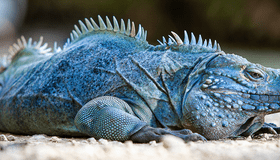
DENVER/December 2, 2020 – Is noise pollution harming cricket populations and, subsequently, the wildlife food chains of which they are an essential part? Morris Animal Foundation-funded researchers at the University of Denver will study crickets as a model for invertebrates to help answer questions about the health and reproductive consequences for them from human-generated noise.
The importance of the study is reflected in the critical role invertebrates play in ecosystems and species survival, particularly those that depend on invertebrates as vital food sources.
“I think we don’t acknowledge the importance of invertebrates in our day-to-day lives, and that there are reasons to be concerned about them,” said Dr. Robin Tinghitella, Associate Professor of Biology in the Department of Biological Sciences at the University of Denver. “They’re important in their own right, but they also provide important ecosystem services.”
Human-generated noise, such as from traffic, is a major and expanding global pollutant. More than 83% of land in the continental United States alone is close enough to be exposed to noticeable vehicular noise. It has dramatic physiological and behavioral impacts on humans, as well as in adjacent natural communities. Less than 4% of noise research has been conducted on invertebrates, however, which severely limits scientists’ understanding of how noise impacts the health of species critically important to most of the world’s food webs.
For this study, the team will first raise 400 crickets, from eggs through maturity. They will be divided into four equal groups and housed in large incubators with attached broadcast speakers. Three of the groups will be exposed to either 50, 60 or 70 decibels of recorded traffic noise throughout their lives. These volume levels are the same as what they would normally hear in their urban and suburban environments. The fourth control group will experience pure silence.
When the crickets are between 7 and 10 days into their adult phase, the team will test their ability to mount an immune response by injecting them with tiny pieces of harmless nylon filament. This will simulate parasite attacks and researchers will measure how the crickets’ hemocytes, invertebrate immune system cells, encapsulate the foreign objects in their bodies.
In order to evaluate the effect of noise on the reproductive system, the researchers will measure the quality of the ejaculate in the males’ spermatophores and, when the crickets die, the team will weigh their reproductive organs.
Researchers will allow the crickets to mate and then will study their offspring to see if there are any lingering parental effects from the past noise exposure. Such effects sometimes stem from changes in gene expression or parental care.
“Many of us have become accustomed to unwanted sounds, but we should be more aware of how they change the world around us and impact all animals, even those that seem ubiquitous and plentiful in our surroundings,” said Dr. Janet Patterson-Kane, Morris Animal Foundation Chief Scientific Officer. “We hope this work addresses an environmental issue that we know causes morbidity and mortality in a wide variety of wildlife species.”
Invertebrates make up more than 95% of all animal species on Earth and form the backbone of most healthy ecosystems. Previous studies have revealed that exposure to traffic noise slows down cricket development, reduces the length of their adult lives and impedes the ability of female crickets to find mates using their songs.
Morris Animal Foundation, headquartered in Denver, is one of the largest nonprofit animal health research organizations in the world, funding more than $136 million in studies across a broad range of species.
About Morris Animal Foundation
Morris Animal Foundation’s mission is to bridge science and resources to advance the health of animals. Founded by a veterinarian in 1948, we fund and conduct critical health studies for the benefit of all animals. Learn more at morrisanimalfoundation.org.
About the University of Denver
The University of Denver: Founded in 1864, the University of Denver is committed to engaging with students in advancing scholarly inquiry, cultivating critical and creative thought, and generating knowledge. The University strives to educate the 21st-century citizens and leaders needed in its organizations and communities. For additional information, visit the University’s newsroom or follow the University on Facebook and Twitter.




